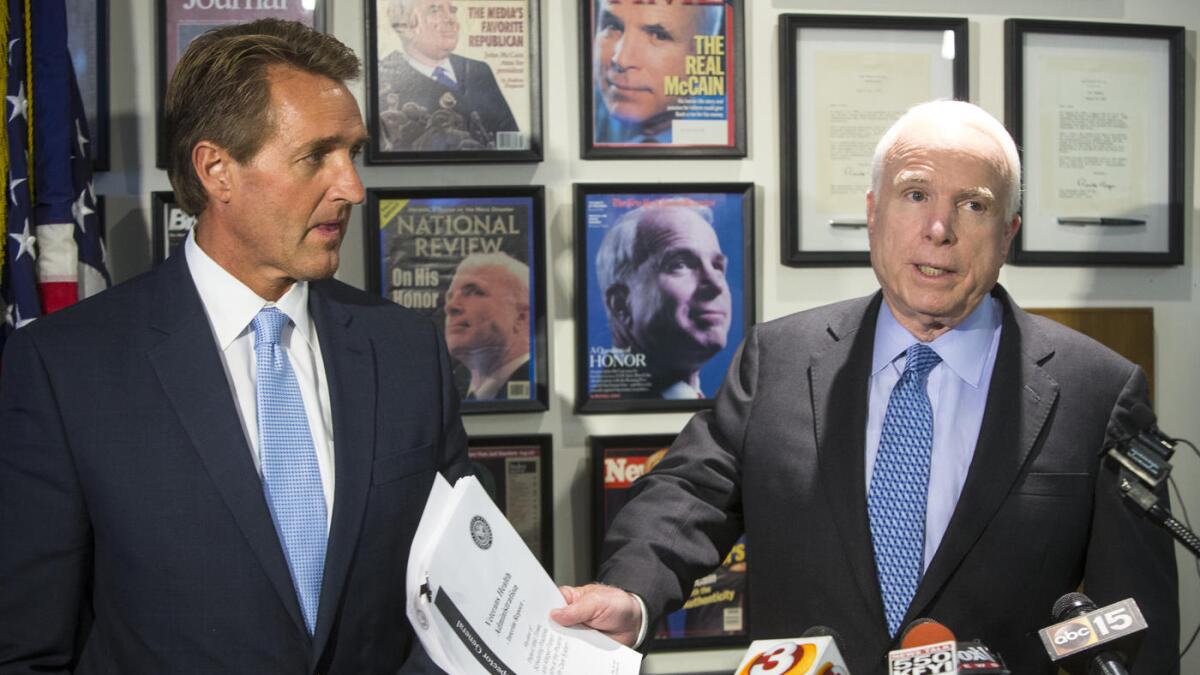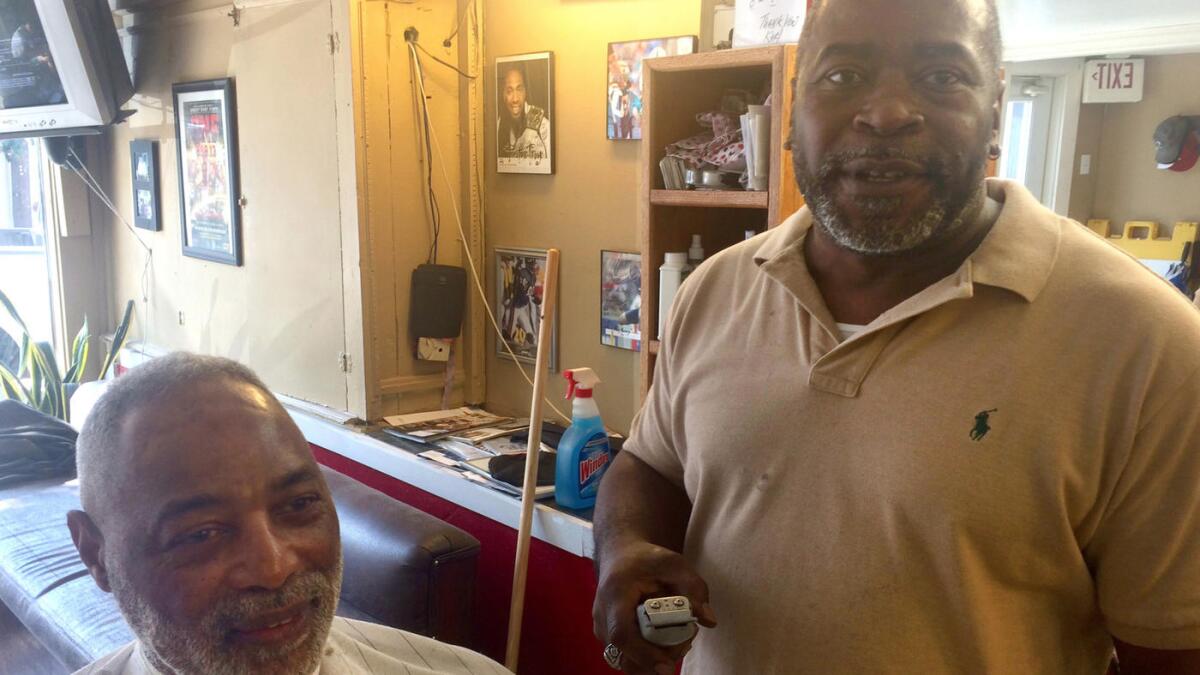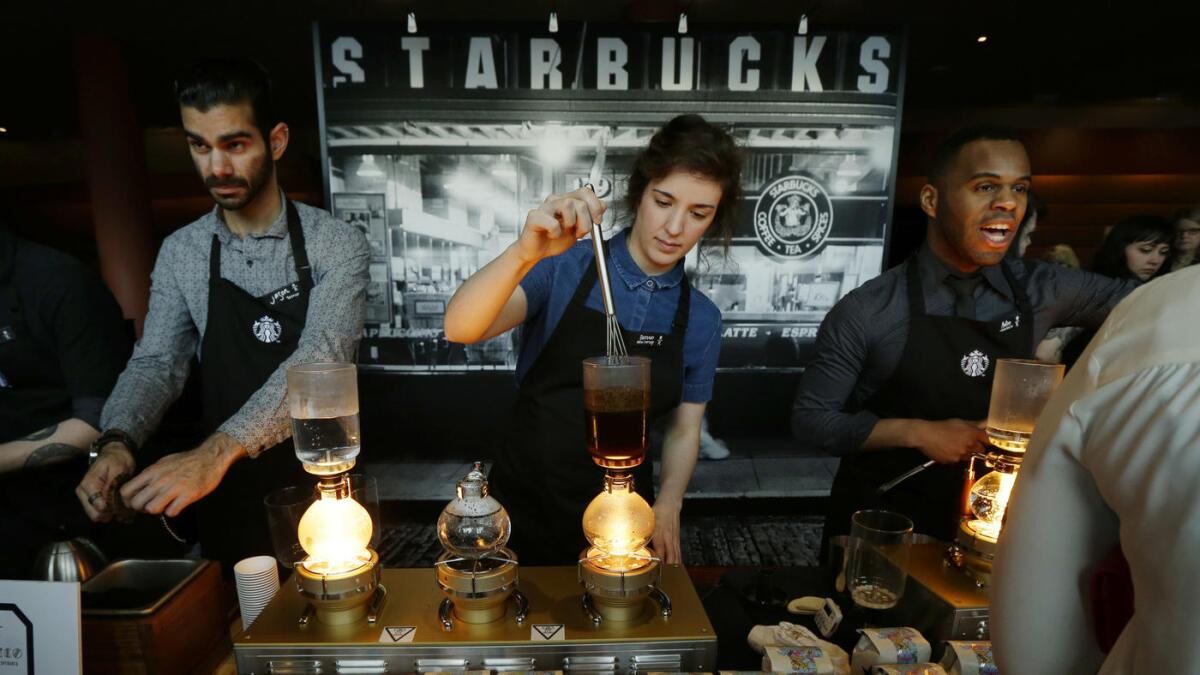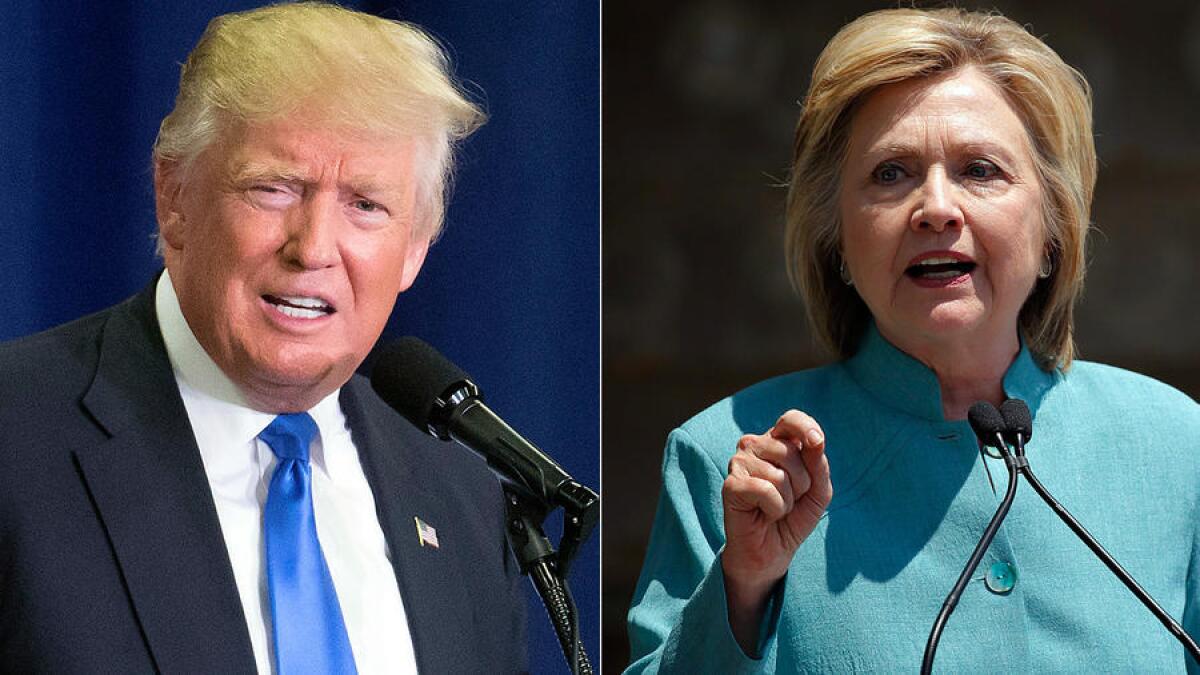Mike Pence is set to release his tax returns, says “we’ll see” if Donald Trump releases his before election day.
- Trump visits a black church, telling the congregation he’s there to “learn”
- The FBI publishes a summary of its investigation of Hillary Clinton’s use of a private email server
- Latino support of Trump drops to 19% in new poll
- The race to 270 electoral votes -- what states matter?
Clinton could win Arizona, GOP senator says

With the presidential race entering its final stretch, Donald Trump continues to face divisions among GOP senators.
Half a dozen Senate Republicans have either refused to support Trump or said they are still on the fence — a level of division not seen since Sen. Barry Goldwater’s ill-fated campaign in 1964.
On Sunday, Sen. Jeff Flake, who represents Goldwater’s home state of Arizona, said he believes that Trump could deliver the usually Republican state to Hillary Clinton.
The senator has said he would like to be able to support his party’s nominee, but so far, “I simply can’t.”
“We cannot, for the future of the party, be associated with this kind of message and with this kind of tone and tenor,” Flake said on CBS’ “Face the Nation.”
“It’s just a — it’s not good for the party. It really isn’t.”
“Arizona should still be a red state,” Flake said. Trump’s “characterizations of, you know, many of the state’s population, have put the state in play,” he added.
“It becomes increasingly difficult to see that he’s going to change, so I don’t expect that I’ll be able to support him in November,” Flake said.
“I’d like to; he’s the Republican nominee. I just don’t see how I can.”
Trump later responded on Twitter that he had recently held a “massive rally” in Arizona, and that Flake was a “weak and ineffective” senator.
Democrats think Georgia may be winnable -- if black turnout is high enough

When Donald Trump first announced his run for president, Karl Booker was intrigued.
From where he stood, behind a barber’s chair in a gentrifying neighborhood near downtown Atlanta, the thought of a political outsider shaking things up seemed promising. Perhaps, he thought, the Manhattan businessman could make government more responsive to people like his own mostly black clientele.
Then, Booker said, Trump “started pandering to the racist side of it” — disparaging Mexicans, insulting Latino Americans, portraying African American life as a hellish slough of crime, poverty and other grim pathologies.
Now, comb and scissors in hand, the 49-year-old Booker draws a red line through the bustling Off the Hook barbershop, with its Barack Obama posters, sports memorabilia and pennants celebrating Georgia’s historic black colleges.
“We in here are going to do everything we can to stop Donald Trump,” Booker declared in a hard, gravelly voice that brooked no doubt.
As the presidential race reaches the Labor Day weekend — once the beginning of the general election campaign but now the beginning of the end — Democrats are considering a serious run at Georgia’s 16 electoral votes. If they do, voters like Booker will be key.
Wage stagnation, which has helped drive voter discontent, may finally be ending

Painfully slow wage growth has plagued the recovery, with many workers seeing few if any raises as they struggle to make ends meet. But there are signs that has started to change.
The falling unemployment rate has led to more competition for workers, spurring solid gains in average hourly earnings in recent months.
Those pressures, amplified by laws providing significant minimum-wage hikes in California, New York and elsewhere, also are triggering changes for the workers who need raises the most. Beginning last year, large companies including Wal-Mart, Starbucks, McDonald’s and JPMorgan Chase increased what they pay their lowest-level employees.
Now, after two years of strong job growth, job openings are near record levels. That’s forced employers to increase pay to attract new workers and retain existing ones, economists said.
Average hourly earnings increased 2.4% for the 12 months ended Aug. 31.
Sanders to campaign for Clinton, hopes to build a movement against Trump
Sen. Bernie Sanders will stump for Hillary Clinton on Labor Day, opening a new political phase as he works to bring his progressive backers to his former rival’s campaign.
Sanders has remained largely in the background since Clinton defeated him for the Democratic Party’s nomination. But the Vermont senator has the potential to boost Clinton’s standing, particularly among the young crowds he inspired during the primaries.
“What you are going to be seeing in the weeks and months to come... is me playing an active role, not only trying to make sure that Donald Trump does not become president of the United States, but that, in fact, we create a movement for this campaign and for the future,” Sanders said on “Meet the Press.”
Sanders’ campaign was fueled, in part, by an economic populism that has been a prominent feature in both political parties, and his work for Clinton could help to ensure his backers don’t drift to Trump’s campaign or to a third party.
Trump’s surrogates, meanwhile, stood by the Republican nominee on Sunday despite his often shifting message, especially his conflicting views on his signature issue of immigration.
His running mate, Indiana Gov. Mike Pence, said Trump has been “completely consistent” on immigration issues. Rather than answer questions about those positions, he sought to focus attention on the email issues that continue to cloud Clinton’s campaign.
Pence called Clinton “the most dishonest candidate for president of the United States since Richard Nixon.”
But Republicans continue to struggle with their candidate.
Sen. Jeff Flake (R-Ariz.) said his state is usually a reliably Republican one, but this year he believes, thanks to Trump’s rhetoric that has criticized members of minority groups, Clinton can win it.
The senator has said he would like to be able to support his party’s nominee, but “I simply can’t.”
“We cannot, for the future of the party, be associated with this kind of message and with this kind of tone and tenor,” Flake said on “Face the Nation.”
“It’s just a — it’s not good for the party. It really isn’t.”
Is the election over yet? No, that’s why we made you this quiz

Emails, insults, allegations. Repeat. And just when it seems that one storyline is the biggest yet, another obliterates it from conversation.
Last week was no different. The campaigns of presidential candidates Hillary Clinton and Donald Trump continued to dominate headlines, tweets and television segments, no doubt continuing to fuel debates between friends and family on both sides of the aisle.
But how much did you pay attention? If you’re one of the few who’s not suffering from election fatigue, test your knowledge.